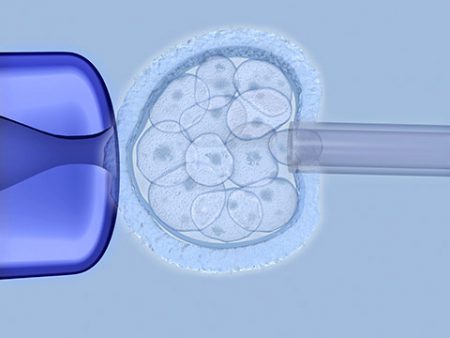
A 26-year-old woman we can call Miriam is a wife and a mother, with a lively toddler. One recent day, she noticed a small lump in her breast.
For Miriam, the news was devastating – not only does she have breast cancer, but she is also the carrier of the BRCA genetic mutation that increased her chances of contracting breast cancer, as well as ovarian and pancreatic cancer.
Because she is a patient at Hadassah Hospital Ein Kerem, she has many options—for cancer treatment, to preserve her fertility, and to avoid passing on the BRCA mutation to any future children. Hadassah broke the chain of passing on the BRACA mutation over 10 years ago by enabling a 38-year-old woman with the BRCA mutation to have her embryos tested through preimplantation genetic diagnosis (PGD) and then implanting BRCA mutation-free embryos.
This breakthrough offers hope to many women like Miriam around the world, who want very much to have children but, of course, do not want to have them burdened with an increased risk of contracting breast cancer.
Although Miriam urgently needed to undergo chemotherapy and surgery, her doctors at Hadassah pressed the pause button on treatment to offer her the opportunity first to preserve her eggs, which could be damaged by chemotherapy. This process, called oocyte cryopreservation, can be done almost immediately. Thanks to new methods, it is no longer necessary to wait for a woman’s natural menstrual cycle to stimulate the ovaries to release eggs. Rather, the eggs can be harvested with a nonsurgical, ultrasound-guided vaginal retrieval procedure and then frozen.
Hadassah’s doctors then presented Miriam with the PGD option. With PGD, at day five of the embryos’ development, a few cells are removed, and their DNA is examined. Once PGD identifies embryos free of genetic problems, including BRCA, the unaffected embryos can remain frozen until Miriam completes her cancer treatment and is able and ready to become pregnant.
At Hadassah, preserving fertility has become an important part of comprehensive treatment for breast cancer patients, especially since more young women are now being diagnosed with breast cancer. While the diagnosis is devastating, women can remain optimistic that the chemotherapy necessary to save their lives need not rob them of their ability to conceive a child once they are well again. In addition, as Hadassah geneticist Dr. Michal Sagi has reported, “One in 40 Israeli women is a BRCA mutation carrier. For those who want to get pregnant, this technique is the most optimistic news they can hear, as they don’t have to pass the risk down to their children.”
